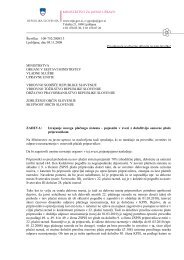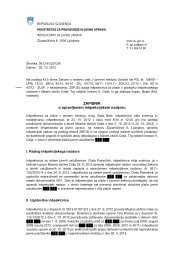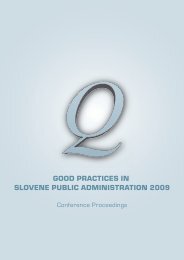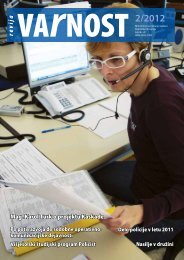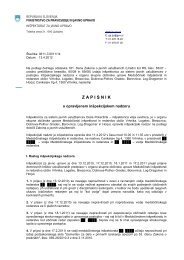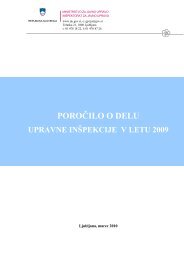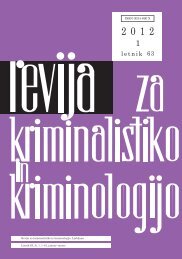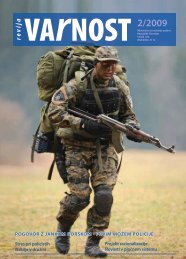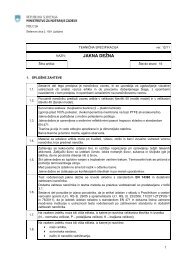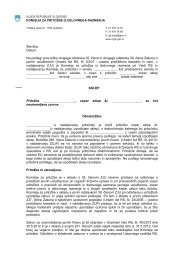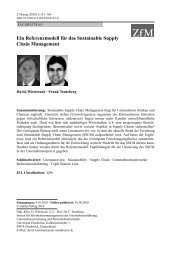Revija 3, 2010 - Ministrstvo za notranje zadeve
Revija 3, 2010 - Ministrstvo za notranje zadeve
Revija 3, 2010 - Ministrstvo za notranje zadeve
You also want an ePaper? Increase the reach of your titles
YUMPU automatically turns print PDFs into web optimized ePapers that Google loves.
<strong>Revija</strong> <strong>za</strong> kriminalistiko in kriminologijo / Ljubljana 61 / <strong>2010</strong> / 3, s. 286-294<br />
Mobbing of trainee doctors in Slovenia: prevalence and impact on<br />
their health in 2009<br />
Polona Selič, Ph.D in Psychology, Department of Family Medicine, Medical Faculty,<br />
Poljanski nasip 58, 1000 Ljubljana, Slovenia<br />
Ana Jakopin, M.D., Department of Family Medicine, Medical Faculty,<br />
Poljanski nasip 58, 1000 Ljubljana, Slovenia<br />
Mobbing is common in educational and health sectors. It is especially common in workplaces in which work tasks are not clearly<br />
defined or are frequently changed. Research shows a high incidence of such behaviour among trainee doctors in various parts of the world.<br />
Mobbing affects health. There are several definitions of mobbing. For the purpose of this research, mobbing is defined as experiencing at<br />
least one of 45 Leymann`s (1990) forms of mobbing behaviour at least once a week over a period of at least six months.<br />
In order to assess the frequency of reported mobbing and the association between mobbing and chosen symptoms in Slovenian<br />
trainee doctors, in April 2009, all 1164 Slovene trainee doctors in aforementioned period were sent an adapted LIPT (Leymann Inventory<br />
of Psychological Terrori<strong>za</strong>tion) questionnaire, together with questions about gender, age, sick leave, working experience, educational<br />
status of the possible perpetrator and chosen symptoms. The respondents’ anonymity was assured.<br />
A 27% response rate was achieved. Six questionnaires were not valid, so a total of 312 questionnaires was analyzed (26.8% of the<br />
population was covered), 77.2% of respondents were female which is in accordance with the population structure of all Slovene trainee<br />
doctors in 2009. A total off 70.8% of trainee doctors reported being subjected to mobbing during training; 40.0% were still experiencing<br />
mobbing at the time of completing the questionnaire. The most common form of bullying behaviour were withholding important<br />
information, verbal aggression in relation to work assignments, work assignments far below his/her capacity, spreading rumours and<br />
work assignments far above his/her capacity. Trainee doctors who were still mobbed during the time of this research reported symptoms<br />
of illness more frequently than the remainder of the sample (p=




